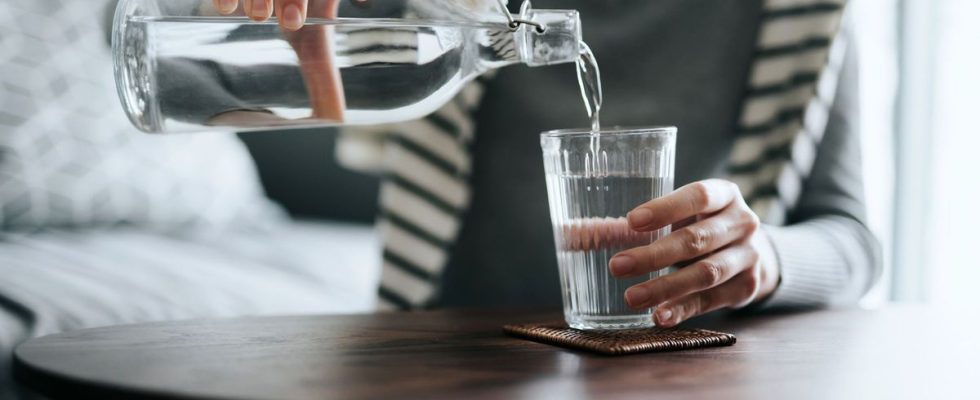Published on
Updated
Reading 4 mins.
It is usually recommended to drink between 1.5 and 2 liters of water per day. These official recommendations could be wrong or at least not suitable for everyone… The very serious answer of the scientists.
Water occupies a central place in the human body. To get an idea, an adult organism of 70kg is composed of 65% water. The amount of this element varies according to body size and age. 90% of this water is contained in blood plasma. To stay healthy, it is necessary to maintain good hydration in our body. A study published in the journal Science believes that the recommendation known to all, namely about 2 liters of water a day, or eight glasses of water a day, does not hold. But then what is the right amount of water to consume on a daily basis to stay well hydrated?
Role of water
The human body is mostly made up of water. Proper hydration is essential to maintain its functioning and ensure essential functions such as:
- eliminate toxins and waste from the body
- regulate body temperature
- contribute to many chemical reactions
- facilitate digestion
- transport nutrients to cells
- manage the amount of blood and lymph
Signs of good hydration
Staying hydrated is crucial, yet difficult to see clearly about your personal needs. One of the most direct markers remains the color of the urine. Darker urine reflects severe dehydration, while lighter urine indicates very good hydration.

Some additional signs to identify to remember to hydrate:
- Headaches, very common in the middle or end of the day, or during alcoholic aftermath
- The thirst
- The cramps
- The constipation
How many liters of water per day?
Indeed, water needs vary according to the outside temperature, the situation in which we find ourselves (pregnant woman, breastfeeding, doing sports, etc.) or even the place: at altitude, for example, needs are increased.
For the co-author of this work, Pr Yosuke Yamada, “the current recommendation is not scientifically valid at all”. Moreover, he points out, “this recommendation does not take into account the food consumed during the day and its water content“.
But then, how much water should we consume each day? For this, the scientists studied the water consumption of a cohort made up of 5604 people aged from one week to 96 years old, in 23 different countries. To calculate the amount of water measured, the liquid was labeled with an isotope, deuterium. The latter is a natural isotope of hydrogen. Thanks to this element, scientists were able to find out how quickly water disappears from our body, tracking it. A way of approaching the estimate of the quantity of water necessary for the body.
But beware, the figure obtained cannot be directly based on water consumption. Indeed, explains another member of the work team, Professor John Speakman, “even if a man in his twenties has a water turnover of about 4.2 liters per day, he does not need to drink 4.2 liters per day“.
What is the right amount of water to drink each day?
However, the researchers were able to estimate how much water an organism needs. That would be 3.6 liters of water per day, on average. But as explained earlier, it is not necessary to drink this amount of water.
Indeed, a good part of the water is provided by the food, it remains to drink only between 1.3 and 1.8 liters of water, per day, to ensure a correct daily intake. According to their calculations, the researchers refine their results and estimate that a “typical middle-aged man might need to drink about 1.6 to 1.8 liters of water per day and a typical woman of the same age about 1.3 to 1.4 liters”
For Professor John Speakman, “this study shows that the suggestion that we should all drink eight glasses of water – or about two liters a day – is probably too high for most people in most situations“. Before concluding that many people simply have to follow “what their body is telling them“.
The risks associated with excess hydration and dehydration
Too much hydration can lead to a disruption of the balance of the body, we then speak of hyperhydration. The sodium/water ratio in blood plasma is altered. Excess hydration will lead to hyponatremia: the decrease in sodium concentration in too much water. The cells can be waterlogged and no longer perform their function. In some cases, neurological disorders can be observed, in more extreme cases, this can lead to coma or even death.
Note that the kidneys have the capacity to filter between 1 and 1.5L of water per hour.
In case of dehydration, great fatigue may be felt, muscle pain may appear as well as dizziness. Heart activity is slowed down, blood pressure drops, kidney failure can be diagnosed.
What are hydrating drinks?
Water remains one of the fundamentals of body hydration. For some, it can be difficult to tame this type of drink. A few drops of lemon or slices of cucumber will flavor it. Coconut water, rich in electrolytes, can be an interesting alternative to stay hydrated.
Conversely, drinks that dehydrate are coffee and tea, recognized for their diuretic properties. Indeed, they promote the elimination of water and salts through the urine. Alcohol, sugary drinks, sodas, fruit juices, energy drinks are also to be limited or avoided to stay hydrated.
